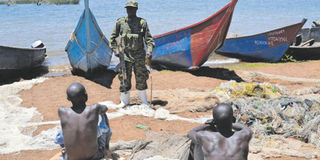Uganda arrests thousands of foreigners over illegal fishing

A Fisheries Protection Unit soldier guards confiscated illegal fishing gear and fishermen suspected of engaging in the vice in Namugongo Landing site in Mayuge District in 2019.
In the six months to December 31, 2024, at least 1,742 foreign fishermen were arrested in a swoop that also caught 8,009 Ugandans who violated fishing laws in Uganda.
The arrested were caught in lakes including George, Edward and Albert, which Uganda shares with DR Congo, as well as Lake Victoria, which is shared by Uganda, Tanzania and Kenya.
Kenyans accounted for the largest number of fishermen arrested, with 935, closely followed by Congo with 557 and Rwanda with 150.
According to Uganda’s fisheries policing force, which is a unit under Ugandan army --Uganda Fish Protection Unit -- those arrested were accused of using prohibited fishing gear, taken to court, charged and convicted.
Some have been deported while others are serving prison sentences in Uganda. Boat seine nets, beach seines, monofilament nets, seine lines, cast nets, and undersized gill nets are banned in Ugandan waters.
“The Congolese and Rwandans were arrested on Lake Albert, Lake George, and Lake Edward shared by Uganda and DR Congo, while the Kenyans were fishing on Lake Victoria,” Lt Lauben Ndifula, the FPU spokesman told The EastAfrican on Wednesday, January 22, 2025.
Experts at the South African Institute of International Affairs (SAIIA), an independent public policy and foreign relations think tank based in Johannesburg, say regional trade in immature Nile perch, linked with the proliferation of illegal fishing gear, has now become the primary threat to the sustainability of Uganda’s Nile perch fishery.
There is no law against immature fish in the DR Congo, making it a lucrative market for fish dealers.
“Uganda is losing about $1.4 billion (Ush5 trillion) annually in revenue. The potential revenue is lost through the illicit gutting of Nile Perch for its swim bladder, the Nile Perch by-catch in silverfish, and the ongoing smuggling of juvenile Nile Perch; makayabu through the Mpondwe border,” says William Tibyasa, the chief executive officer of Uganda Fish Processors and Exporters Association (UFPEA).
Gutting
A conservative analysis of the potential revenue losses shows that over $121.7 million (Ush443.1 billion) is lost annually through illegal gutting to supply the illicit fish maws market.
Leaders of landing sites in Entebbe municipal council, Kampala, Mukono, Jinja and Buikwe districts have raised concerns about a sharp decline in fishing catches.
Shrouded in uncertainty over fish supplies, Uganda’s fish exports have also taken a hit, falling from Ush626.6 billion ($170 million) in 2023 to Ush590 billion ($160 million) last year, the industry data shows.
Export data from the fish processors for the 12 months to December 31, 2024, shows fish volumes fell by 11.3 percent from a high of 22,000 tonnes in 2023 to 19,500 tonnes last year
“The year 2024 was challenging for the fishing industry," says Shahul Hameed, the chairman of the Uganda Fish Processors and Exporters Association (UFPEA).
However, Hammed explains that through consistent dialogue and lobbying with the government, partners and other stakeholders, UFPEA has focused on protecting the Nile perch, a cornerstone of the fishing industry where immature fish dominate the catch.
Smuggling menace
According to the exporters, trucks transporting immature fish reach near Mpondwe border and are diverted into the bush where they are offloaded. The fish is ferried into Congo using tricycles, before it is loaded onto waiting lorries.
The Mpondwe border market is the largest fish market in East Africa, with an average of 21 trucks from Kenya, Uganda, and Tanzania offload a combined 482 tonnes of makayabu valued at $500 million.
The western route is used by both Ugandan and Tanzanian fish traders, who deliver 185 tonnes of both makayabu and mugongowazi using trucks.
Route managers
Route managers act as consultants and broker-dealers with technical, political, and enforcement teams. Some brokers deal in the upstream operation while others in downstream—road transport and markets.
For instance, on January 22, 2024, FPU says a UPDF pick-up truck Reg Number H4DF 2372 with 764kg of immature fish worth Ush10,000,000 ($2,714) was impounded in Kasese and the driver arrested.
FPU Commander Lt. Col. Mercy Addah Tukahirwa says breaking all criminal syndicates and networks of untouchables involved in illegal fishing activities and trade without compromise is top on her cards.





